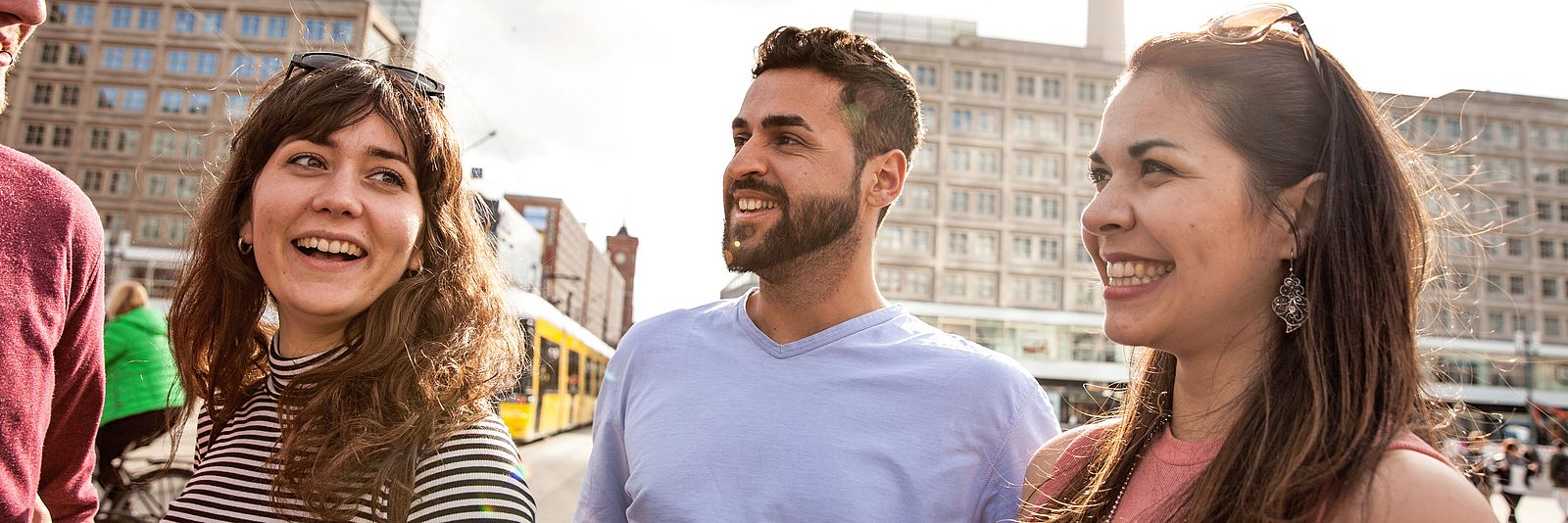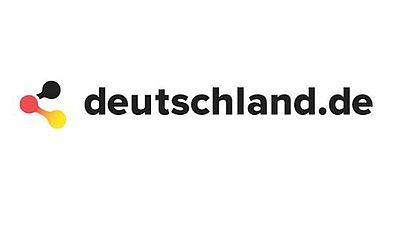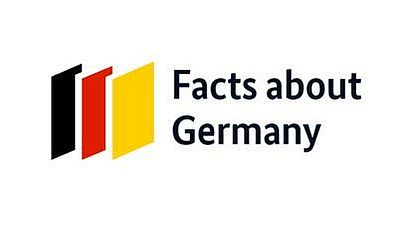
Useful everyday knowledge
Find answers to frequently asked questions about Germany. Topics range from public holidays and emergency numbers to mobile phone contracts.
Useful everyday knowledge
Many things are different in Germany, such as opening hours of stores, waste separation or the purchase of a SIM card. Here you will find answers to the most important questions about everyday life in Germany.
What public holidays are there in Germany?
In Germany, public holidays are determined by the federal states. The only exception is the national holiday on 3 October – the Day of German Unity – which is set by federal law and applies throughout Germany. There are also a number of public holidays that have been declared by all the federal states, which means that they apply to the whole of Germany. Examples include New Year’s Day, Easter and Christmas. In Germany, you do not have to work on public holidays and your children do not have to go to school. Shops and supermarkets remain closed on public holidays, which is why many German families use such days to go on trips or simply to relax. Most public holidays in Germany have a religious background, especially at Christmas and Easter, when a sense of peace and quiet is expected.
The climate in Germany
Germany has a temperate climate with continental influences. This means that there are distinct seasons with different temperatures. The average annual temperature is 10.9 degrees.
In the north of Germany, especially in the coastal regions, the climate is often cooler and harsher. Here the weather is characterised by wind and rain. Southern Germany has a lot of forests and mountains, with an alpine climate in some high-altitude areas. Despite its climate zone, Germany has a relatively warm climate for Central Europe due to the influence of the Gulf Stream, with temperatures often rising above 30 degrees in summer.
What plugs and sockets are used in Germany?
The most common plugs in Germany are Type F and C. Type C plugs are also known as Europlugs. Virtually all sockets in Europe are compatible with these plugs. It is important to note that the sockets in Germany are designed for a mains voltage of 220-250 volts. The Schuko Type F plug can also be used in most European countries. This plug is mainly used for larger electrical appliances such as washing machines. Another type is the contour plug, which, like the Europlug, is used for similarly small appliances.
What are the shop opening hours in Germany?
In Germany, not all shops are open every day. Shop owners are free to decide how many hours they are open, as long as they comply with the rules of their federal state. Large supermarkets are usually open at least from 7 am to 8 pm, although urban supermarkets tend to have longer opening hours than those in rural areas. Smaller outlets often close in the afternoon on Saturdays. Most shops are closed on Sundays and public holidays. Some, such as petrol stations and railway station shops, are open on Sundays. Pharmacies also provide an emergency service on Sundays to ensure that medical care is available locally.
What are the emergency numbers in Germany?
In an emergency, it is important to know the emergency numbers to call for help. Emergency calls are free.
110: The emergency number for the police. This is the number to call if you have an emergency requiring police assistance. Cases that may require police involvement include criminal offences or situations where you feel or suspect that you are in danger.
112: The emergency number for the fire brigade and emergency services. Call this number in the event of a fire or acute medical emergency. Examples include severe injury or allergic shock. You can usually call 112 even if there is no signal. The phone uses another operator’s mobile network to make the emergency call.
116117: This is the number for the non-emergency medical on-call service. You can call this number if you need medical help but your situation is not life-threatening. If normal surgeries are already closed, this is where you can find out which out-of-hours surgery is open in your area. If you are too ill to go to the doctor, the emergency medical services can also send a doctor on call to your home.
How can I buy a SIM card?
You can buy a German SIM card in places like supermarkets, discounters and drugstore chains, or directly from a mobile phone provider’s shop, and sometimes at kiosks and petrol stations. You will need to bring proof of identity to activate the card. If you do not yet have German documents such as a registration certificate or a residence permit, you may have problems with some providers. In this case, please contact the consumer advice centre (Verbraucherzentrale) (External link) in the federal state where you live. For more information on mobile phones and contracts, please refer to the “Handbook Germany” website under the heading Mobile Phone Contracts (External link) .
What do I need to consider when taking out a mobile phone contract in Germany?
To take out a mobile contract in Germany, you need to meet a number of requirements: you must have an identity card or passport, bank details and a place of residence in Germany. Mobile phone providers often also require a Schufa report – a document that proves your creditworthiness. In most cases, however, you do not have to provide the Schufa report yourself, but simply have to sign a consent form allowing the provider to access your credit history. Once you have all the necessary documents, you are free to sign a contract of your choice.
Mobile phone contracts are usually for 24 months and can only be cancelled after the minimum term. Some contracts include a mobile phone. If this is the case, it is important to compare the price of the contract with others to see if it is a good deal. The best way to compare contracts is online, where you can see different offers and their prices at a glance.
If you do not want to sign a contract, you can buy a prepaid mobile phone.
How does the postal system work in Germany?
Sending mail in Germany is fast and usually inexpensive. Post offices are often open into the evening during the week. They close at noon on Saturdays and are usually closed all day on Sundays. In larger cities, some branches are often open longer at weekends.
You can send both letters and parcels via the post office. Letters can be posted in roadside letterboxes. Stamps cost between €0.85 and €3.00, depending on the size and weight of the letter. Prices for parcels are slightly higher. These can be taken to your local post office. There are also automated Packstations in many places, which are unmanned and therefore open at all times. You can use a Packstation to send parcels or collect parcels that could not be delivered to your home. It is also possible to have parcels ordered online sent directly to a Packstation. This means you do not need to be at home to receive your parcel. You can collect it at a time that suits you.
Within Germany, letters and parcels are delivered within three working days and in many cases even faster. If you want to make sure that your letter arrives quickly, you can pay a surcharge for delivery on the next possible working day.
Waste sorting in Germany
A distinction is usually made between the following types of waste:
- Yellow bin (referred to as “gelbe Tonne”, “gelber Sack” or “grüner Punkt”): Plastic waste (all packaging that is not made of paper or glass, e.g. juice and milk cartons, tin cans, yoghurt pots, etc.) is recycled/reused.
- Blue bin (referred to as “Altpapier”): Cardboard and paper waste (e.g. newspapers, parcel boxes, cigarette packets), with the exception of heavily soiled/oily paper packaging such as pizza boxes, which should be disposed of in residual waste - is recycled/reused.
- Black bin (referred to as “schwarze Tonne”): Residual or household waste and any waste that cannot be recycled (e.g. sanitary products, vacuum cleaner bags, cigarette butts, soiled packaging).
- Green or brown bin (referred to as “grüne Tonne”, “braune Tonne” or “Biomüll”): Fruit and vegetable scraps, egg shells, coffee grounds and leaves can be composted.
You will usually find these four bins in your backyard or basement. If you do not have a green or brown bin, your green waste will be collected on certain days by the refuse collection service. For all other types of waste, you will need to go to one of the containers listed below in your area.
Special rules apply to large bulky waste, hazardous waste and electrical/electronic waste. You must either register this waste for collection or take it to a recycling depot. Small batteries and electrical appliances can sometimes be disposed of in special boxes in supermarkets or in a special container. You can take used clothes to your local clothes bank. There are penalties for improper waste disposal or fly-tipping.
Many drinks containers are subject to a deposit (Pfand) in Germany. You pay between €0.08 and €0.25 more for the drink in the supermarket, which is refunded when you return the empty container. You simply return the bottle or can to a reverse vending machine in the supermarket and hand in the receipt at the checkout. There is usually a special symbol printed on the bottle to indicate that it has a deposit.
Glass bottles that do not have a deposit (e.g. oil, wine, vinegar) must be disposed of in the bottle bank together with other glass jars and bottles (e.g. jams, sauces, mustard). There are three different containers: amber glass, white glass and green glass. Please note: It is not permitted to dispose of glass at night or on public holidays due to the noise. Drinking glasses and window panes should be disposed of as residual waste.
You can find more information on the topic of “waste” here (External link) .
Keeping a pet in Germany
Pets are very popular in Germany. However, there are a number of rules that pet owners should be aware of.
If you live in a rented property, you must check your tenancy agreement to see what pets, if any, you are allowed to have.
Almost all municipalities charge a dog licence fee. Some federal states have additional requirements for certain types of animals. For example, specific breeds of dog must be kept on a lead or muzzled. Liability insurance may also be required for some breeds. Even if it is not compulsory, it is often wise to take out such insurance as you, the owner, are liable for any damage caused by your pet. Some small animals, such as cats, can often be included free of charge in your personal liability insurance. If you want to keep an exotic animal, you should also check the local regulations.
Special rules apply if you come to Germany with the intention of bringing your pet from abroad. There may be requirements such as a minimum age or vaccinations for the animal. The details vary greatly depending on which country the animal comes from. An overview of the conditions that apply when you bring your pet to Germany can be found on the internet.
Information on the web
- Goethe-Institut Pre-integration
- Integration through Qualification (IQ) IQ advisory services for individuals with foreign qualifications in Germany
- International Organization for Migration | IOM, UN Migration Resources for Navigating Life in Germany: Workbook & Digital Companion App
Do you have any questions?
Let us advise you on your opportunities to work and live in Germany. Our experts will support you with questions regarding job search, visa, recognition and learning German.
You can find out more about the various contact options by clicking on one of the icons in the bar below.



